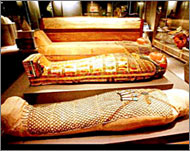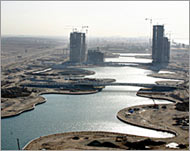Dubai: A magnet for young Arabs
It was not the choking pollution, the crippling traffic, or the run-down infrastructure that drove Fahd from Egypt to Dubai.

It took one final push for the 26-year-old to uproot himself from one of the richest civilizations in the world to the young emirate.
|
|
“Everything has become expensive and I am not referring to cornflakes, I am talking about bread and lentils,” said the 26-year-old, blaming soaring prices and a dilapidated economy for uprooting him.
Faced with unemployment and low standards of living brought about by the ossified state economies of their own countries and confronted with anti-Arab sentiment in the West, thousands of young Arab graduates like Fahd see Dubai as a chance for a pleasant life and challenging career.
Liberal lifestyle
 |
|
Fahd left Egypt with its ancient |
Dubai – enjoying phenomenal financial growth and marketing itself as the business and leisure centre of the United Arab Emirates – is attracting people from around the world by offering tax-free salaries and a lavish and liberal lifestyle.
Despite UAE’s rapidly expanding population – up 7.6% to 4.04 million in 2003 – per capita income remains high, reaching $18,870 in 2002.
A 2002 UN report found that growth in per capita income among 22 Arab countries in the past 20 years averaged just 0.5% – one of the lowest in the world.
Half the region’s Arab youth want to leave because of an average unemployment rate of 15%, three times the world average.
Foreigners make up 85% of the population of oil-rich UAE, whose nationals represent less than 10% of the workforce. The percentage of foreigners is the highest in the Gulf.
|
A 2002 UN report found that growth in per capita income among 22 Arab countries in the past 20 years averaged just 0.5% – one of the lowest in the world. |
Young Arabs say Dubai is a breath of fresh air affording them a taste of a well-heeled life many had only seen in movies and could only dream about in their third world countries.
“Wow, would you look at that beauty there!” said another young man, his eyes sparkling as he pointed to a gleaming black Porsche. “I can probably buy it in a few years. This wouldn’t have been possible back in Egypt.”
Corporate heavyweights
In Dubai, people can mix with a cosmopolitan jet-set crowd, drive luxury cars, buy brand labels, attend concerts by international artists and network with corporate heavyweights.
Its nightclubs and pubs are unheard of in its conservative Gulf neighbours.
But the glitter often eclipses the hard conditions in which tens of thousands of foreign labourers live and work.
The UAE – like other energy-rich Gulf states – has used cheap labour to move from a desert state into a modern one with an efficient network of roads, shipping and banking.
 |
|
Dubai’s skyline is ever-changing |
Officials say they are trying to improve labour conditions.
Still, it is not only sunny skies for college graduates hailing from countries like Egypt, Lebanon, Syria and Jordan.
“I found Dubai one of the best options in the Middle East … Here, my future wife can enjoy a liberal life like in Beirut,” said Lebanese Karim Tahir, who decided to move from the United States after the 11 September 2001 attacks and to settle in the Arab world.
So far, experts say there is no real competition from UAE nationals, most of whom vie for bank and government jobs.
“Many [Arabs] are keen to come, not only for money, but also for the lifestyle. Given the continuing growth and fame of Dubai, we expect more jobs to open up,” said a Dubai-based recruiter.
Western passport
|
“Dubai is a bus-stop to the West. It can catapult your career and life to better things” Maie Izz al-Din, |
Sociologists say today’s Arab migrants to the Gulf are less transient than during the Gulf’s 1970’s oil boom. Many of those who do go leave for a Western passport.
They use Dubai as a base from which to immigrate after they have saved money, trained with multi-nationals and mingled with a vast Western expat community.
“Dubai is a bus-stop to the West,” said Maie Izz al-Din, an account executive in a top US firm. “It can catapult your career and life to better things.”
As for Fahd, he does not intend to return to his homeland.
“My parents lived in Qatar with a specific mission to save money for a number of years before they went back to Egypt. As for me, I’m not returning. What for? There’s no hope in the foreseeable future for our countries.”